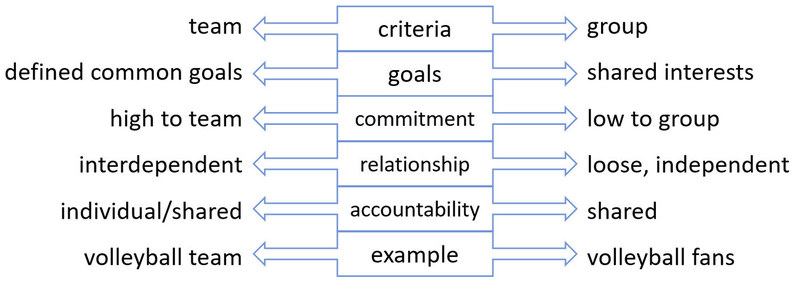Have you ever worked in a group that seems stuck in endless discussions, where nothing seems to get done; and then, shortly before the submission deadline, one or two members scramble to complete the task in order to hand in a hurried piece of work on or after the deadline? Or conversely, have you ever been a member of a group where every participant reaches out to their fellow team members, where everybody is glad to contribute and has a clear idea of their tasks, and where you feel that working together has enabled you to achieve more than you would have been capable of on your own?
Most of us are likely to have experienced both, i.e. being a member of a group that never managed to develop into a team, with members pulling in opposite directions, as well as witnessing the satisfying and enriching experience of working in a group with an open and productive atmosphere where everyone's voice is heard and these voices are formed into a consensual group objective. The reasons for each of these very different experiences are manifold, but we can state from the outset that simply 'throwing' people together because they possess certain qualifications, expertise or are located in a geographical area or department with no further thought is unlikely to make an effective team. A fully functioning team, as opposed to a work group, is characterised by collective thinking and the development of a team identity and mutual cooperation.
Knowing that a team matures by moving through different development stages and knowing how this process can be supported is one important precondition for moving from a loosely put together group into a team. It is also vital to understand that a virtual team is an extremely dynamic entity and every team differs in its path and speed of development. Some, for example, develop in an ad hoc manner due to an emergency, and may not even attempt to become a fully-fledged team. In contrast, there are also stable teams with a consistent leadership, clearly defined roles and functions where the members have developed a sound working relationship over many years.
In the light of this, the purpose of this unit is to raise awareness of the different processes involved in becoming a team and to outline some steps which encourage the development of a well-functioning team.
Task: Differences between a group and a team
One of the first things we need to differentiate is the difference between a group and a team. Look at the figure below and in your own words, note down the main differences in your learning journal.

Diagram developed by Andrea Voigt for this course
Having completed this task, click on the following link to view a possible answer.
Show / hide sample answer
This is Alexa's answer
A major difference is that a group is a loosely coupled bunch of people sharing an interest and have an understanding of common bonds or in other words, are aware of one another. In contrast, a team is interdependent, has a clearly defined goal and members have a high commitment towards achieving this goal. This means that for a team to become fully effective, they have to cooperate and thus coordinate their tasks closely, develop a common work rhythm and a team identity. Their goal ultimately is to think and act like a team which produces a result which they could not have without the cooperation with other team members.